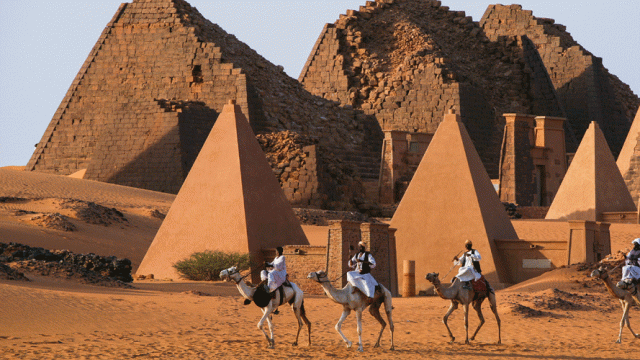Pyramids are fascinating monuments. Built thousands of years ago, they still stand, a true test of time and ancient engineering marvel. Egypt is most popular with tourists. They come from far and wide to Giza, across the Nile from Cairo, to see the Great Pyramid and the others in the same complex. Tours are plenty, some even go on camel rides to the other side to get beautiful landscape photographs of the pyramids. However, while Egypt gets so much world attention, neighbouring Sudan barely gets a mention. Did you know that the country has almost double the number of pyramids than Egypt?
I’ve always been fascinated with pyramids. have always been an attraction. I got a chance to visit Sudan when I was deputed on an oil exploration assignment to the country some years ago. I’d always heard of Egypt but when I heard of the pyramids in Sudan, I knew that I had to visit. I cajoled my colleagues to visit the monuments at the first opportunity that arose. It came at the end of the tourist season when the sun was still hot. That didn’t deter our mission. We drove to the nearest pyramid site of an ancient city – Meroë – in the Nubian region.

The ancient city of Meroë is located on the east bank of river Nile, near the city of Al Bagrawiya. It is the last great burial site of the Royal Black Pharaohs or the Kings of Kush. Meroë is easily accessible by road, about 200km northeast of Khartoum, the capital, which located just south of the confluence of the Blue and White Nile rivers.
The region from Khartoum to the north is better known as Nubia and had seen the rise of three major kingdoms. It was ruled by the Kushite dynasty since 2600 BCE. Apart from Meroë , the other two big Kushite kingdoms developed around Kerma and Napata. Whereas the first Kushite kingdom (around Kerma) developed a unique, exclusive culture; Napata and Meroë were greatly influenced by the Egyptian way of life. The kings of Napata in northern Sudan believed in burial customs the way ancient Egyptians did. They even employed Egyptian artists in creating the architectural gems. While the Napatan region was occupied by Egypt in later years, the third Kushite kingdom continued the practice of building pyramids at Meroë from the royal city of Al Bagrawiya.
The pyramids at Meroë range in various sizes. The larger ones were made for royalty while the smaller ones for nobles. Unfortunately, when I went, I found many pyramids were damaged and saw restoration work on. While we’ve all heard of stories of plunder by grave robbers and early adventurists in Egypt, Sudan, too, faced something similar. We found out that Giuseppe Ferlini, an Italian treasure hunter and adventurer in the 19th century, had smashed the tops of at least 40 such pyramids in search of gold. It gave me great joy to see that various countries are collaborating to preserve and conserve these pyramids today. While much work remains to be done, the pyramids have stood the test of weather and time for centuries, and will remain so for many more years.
The information
Getting there: The pyramids at Meroë are located in the north of the country. It’s best to travel from Khartoum. While there are no direct flights from India to Khartoum, Gulf Air, FlyDubai, Air Arabia among others fly between the two countries. The best time to visit Sudan is during the winter. A trip to Meroë can take a full day. Bring your own food and water, cap, umbrella and camera. If you don’t want to do the journey on your own, use one of the many travel agencies in Khartoum who organise trips to see the pyramids. They can range from day trips to longer ones. More info:info@sudan-tourism.gov.sd




